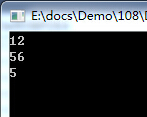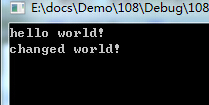首先,看看变量的存储:
int global ; int main() { int stackStore ; int heapStore* = (int *)malloc(sizeof(int)); }
变量global存储在全局数据存储区,stackStore存储在栈中,heapStore存储在堆中;
static作为静态修释符用法:
1.static可以用来修饰变量,也可以用来修饰函数,其用法相似;
2. static可以静态的呈现一个变量,在作用范围内不会改变变量的值;
3. 但是如果函数的局部变量复写了变量的值,那么这个值在当前局部函数内有效; 若出了当前局部范围,static的值生效;
例一, static在全局范围内,用include扩展static的作用范围, 用extern扩展函数的作用域:
107.h
#ifndef _107H_
#def _107H_
extern void func();
#endif
107.cpp
#include "stdafx.h"
#include <stdio.h>
#include <string.h>
#include "107.h"
voic func()
{
x = 12;
printf("%d
", x);
}
108.h
#ifndef _108H_
#def _108H_
extern void func1();
#endif
108.cpp
#include "stdafx.h"
#include <stdio.h>
#include <string.h>
#include "108.h"
voic func1()
{
x = 56;
printf("%d
", x);
}
109.cpp
#include "stdafx.h"
#include <stdio.h>
#include <string.h>
#include "107.h"
#include "108.h"
int main()
{
func();
func1();
printf("%d", x);
}
输出结果为:

例二,static在当前文本作用域,用extern扩展函数的作用域:
file1.h
#ifndef _FILE1_ #define _FILE1_ extern void func1(); extern void func2(); #endif
file1.cpp
#include "stdafx.h"
#include <stdio.h>
#include <string.h>
#include "file1.h"
static char* hello = "hello world!";
void func1()
{
printf("%s
", hello);
}
void func2()
{
hello = "changed world!";
printf("%s
", hello);
}
file2.cpp
#include "stdafx.h" #include <stdio.h> #include <string.h> #include "file1.h" int main() { func1(); func2(); return 0; }
输出结果:

!!! 若将static char* hello = "hello world!"放入func1, 如下;
file1.cpp
#include "stdafx.h" #include <stdio.h> #include <string.h> #include "file1.h" void func1() { static char* hello = "hello world!"; printf("%s ", hello); } void func2() { hello = "changed world!"; printf("%s ", hello); }
那就会出错,错误为:

